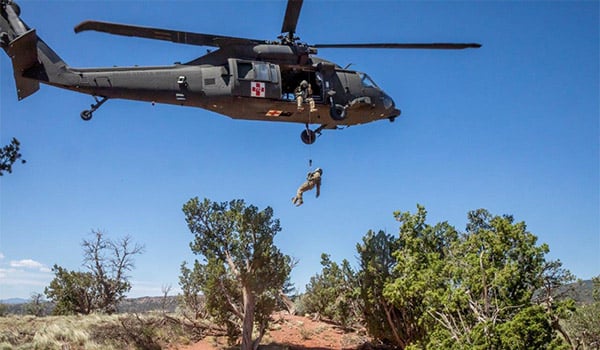
Reserve / By SGT Alex Morgan: Within the Aviation community, standardization and safety play a vital role in ensuring the effectiveness and safety of training and operations. SGT Joshua Maldonado, the standardization instructor in Company C, 7th Battalion, 158th Aviation Regiment, 11th Expeditionary Combat Aviation Brigade, stresses the importance of standards and safety.
“It’s one thing if a unit does things a certain way and it works for them, but what happens if a Soldier transfers to a different unit that does things differently? They might not have enough time to relearn that standard before it is time to execute a mission.” Maldonado said. “If it’s standardized the same everywhere, then it ensures that all the crews are training and learning the same way to avoid life-threatening mistakes.”

A Soldier in Company C/7-158, 11th Expeditionary Combat Aviation Brigade, descends from a UH-60 aircraft during hoist training at Fort Carson, CO on Nov. 2, 2019./ U.S. ARMY PHOTO BY SGT ALEX MORGAN
Aviation allows little room for error for everyone involved. Pilots, flight medics, and crews are all responsible for not only their own safety but also the safety of others. With higher risk operations such as hoist training and high-altitude flights, it is critical that Aviation Soldiers properly implement standards to prevent injury or loss of life.
It is the standardization instructor’s responsibility along with the standardization pilots, instructor pilots, and flight instructors to evaluate the readiness of personnel. They teach and enforce the standards. Maldonado explained that, “if something is done unsafe and not to the standard, then the chances of something life-threatening happening goes up. The risk is greater in an Aviation unit compared to some other types of units because everything we do is inherently dangerous, so we stress risk mitigation and evaluate our Soldiers to figure out the safest way to train and perform our missions without unnecessary risk.”
Standardization instructors not only enforce the standards but are also the primary trainers for unit personnel. The standardization instructor will give no-notice evaluations to Soldiers on a frequent basis. These evaluations occur at random times to select personnel to ensure that they are keeping up with their knowledge and training.
“These evaluations are very important because we might have a pilot or crewmember that has not flown in a while, and we need to make sure that they are keeping up with the proper standards that come with the training. Since it’s completely on the spot, whoever gets evaluated has to be able to execute the given task or demonstrate their knowledge off the top of their head to prove they are capable of conducting the training safely.”
“Once someone reaches Readiness Level 1, it’s my job as a standardization instructor to make sure that they remain proficient and continue to train to the standard. It’s imperative they are prepared for the mission regardless of the conditions or situations they may face,” said Maldonado.
SGT Maldonado works closely with Chief Warrant Officer 3 Phillip Strickland, the safety officer in C/7-158. This relationship is vital since the standardization instructor ensures attainment of critical training objectives in a variety of conditions, while the safety officer analyzes the situation and determines whether the training will be unnecessarily dangerous. “Our mission does not stop because it’s extremely hot or cold, but we have to make sure that the benefit of training outweighs the risk. No amount of training is worth someone losing their life or getting seriously injured in the process,” explained Maldonado. “High winds are probably one of the most important things to consider in Aviation”. Maldonado continued, “it’s up to myself and the safety officer to determine if training should be called off if wind speeds are too high. This is an especially critical consideration when preparing a live hoist training scenario.”
By maintaining standards throughout the Army and Aviation community, units are able to achieve a higher level of readiness across a multitude of environments and theaters while remaining as safe and effective as possible.
SGT Alex Morgan is the public affairs NCO for the 11th Expeditionary Combat Aviation Brigade, Fort Carson, CO.








